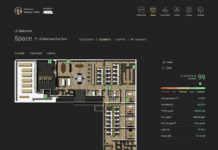According to a recent survey by the STO Building Group, while cost and education remain barriers to implementing more progressive sustainability measures in the built environment, there is growing interest in such measures as embodied carbon accounting and smart buildings.
Now in its fourth year, the survey anonymously polls a select group of senior commercial real estate owners, end users, and industry partners to get a sense of the current state of sustainability, wellness, and resilience and what trends they predict for the near future. In addition to questions on third-party certification systems, challenges to building green, the perceived value of wellness features, and building for climate change, among others, this year’s survey asked participants about embodied carbon in buildings and the role of smart building technologies in building efficiency.
This year’s responses, collected informally and not as a scientific sampling, indicate that sustainable building is fairly ingrained at this point, but more work is yet to be done:
- Green building is perceived as common practice. This year 0% of end users agree that green building is a passing fad, and 0% think it is pushing the envelope, a slight improvement over past years. There has also been a steady uptick over the last three years of end users who believe green building is becoming or already is a code requirement (89%).
- Smart building technologies are expected to help with building efficiency. Nearly half of respondents state that one-quarter or fewer of the buildings in their current portfolios are “intelligent” buildings. However, 60% plan to incorporate sensors and technologies into their project to track sustainability measures in the next two years.
- Attention on carbon emissions is gaining. 52% report understanding embodied carbon — the carbon dioxide emitted during the manufacture, transport, and construction of building materials — together with end of life emissions, and 48% will require embodied carbon accounting on future projects.
- Wellness continues to matter. 50% of respondents indicated industry standards for wellness are not enough. 88% say that incorporating wellness features into their buildings is essential.
- Resilience continues to lag behind. More respondents this year (58% in 2019 versus 45% in 2018) acknowledge that industry standards for resilient building are not enough. However, only 42% plan to seek external expertise.
- Clients expect their partners to be sustainable. 82% say that it is important that their service providers have a robust environmental sustainability program.
The below image features highlights from the STO survey: “It is more apparent than ever that human health is tied to our environment, and the health of both must be addressed in tandem,” says Jennifer Taranto, STO’s director of sustainability. “Our survey looks directly to our industry colleagues to provide their take on that link and on the impact the changing face of sustainability is having on commercial real estate.”
“It is more apparent than ever that human health is tied to our environment, and the health of both must be addressed in tandem,” says Jennifer Taranto, STO’s director of sustainability. “Our survey looks directly to our industry colleagues to provide their take on that link and on the impact the changing face of sustainability is having on commercial real estate.”
STO plans to continue conducting this survey on an annual basis. The hope is that as building practices and contextual circumstances change over time, the report will help detect and analyze the impact of growing trends on the present and future state of sustainable building.
Copies of the full report are available in the Sustainability section of structuretone.com.
The STO family of companies is comprised of: Structure Tone, Structure Tone Southwest, Pavarini Construction Co., Pavarini McGovern, LF Driscoll, LF Driscoll Healthcare, Govan Brown, Ajax Building Corporation, and BCCI Construction Company, with offices throughout the U.S., Canada, UK, and Ireland.
Want to learn more about construction and facility management topics
Looking for updates? Check out all the latest facility management news related to Sustainability and Environment.

















![[VIDEO] Collect Asset Data at the Speed of Walking a Building](https://facilityexecutive.com/wp-content/uploads/2024/02/maxresdefault-324x160.jpg)